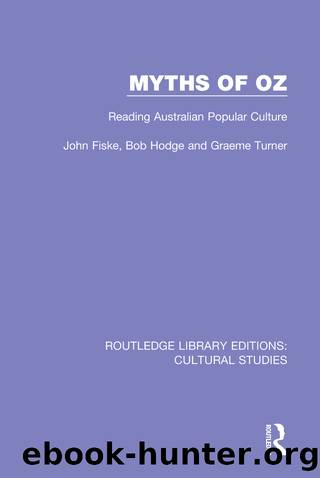Myths of Oz by John Fiske Bob Hodge Graeme Turner

Author:John Fiske, Bob Hodge, Graeme Turner [John Fiske, Bob Hodge, Graeme Turner]
Language: eng
Format: epub
Tags: History, Australia & New Zealand, Civilization, Social Science, Popular Culture, Sociology, General
ISBN: 9781315511399
Google: rvUwDQAAQBAJ
Publisher: Routledge
Published: 2016-10-04T03:24:12+00:00
This list shows clearly the point of contact between school and prison, for children, and the kind of issues that can be explored through this kind of program. Where quiz shows focus on knowledge as a commodity linked to other commodities, underpinned by an all-pervasive and unquestioned set of social rules, Prisoner focuses on the operation of power, the imposition of r les by social agents who are good and bad, but mostly indifferent, and it takes the position of subordinates who accept the regime reluctantly at best. In this way, Prisoner could be seen to adopt a critical perspective, explicitly from outside the social consensus. It mobilises children's experience of the operation of power in schools, and so the connection it makes with the world of work is itself potentially critical. Alternatively, its linking the world of work, and the working class, with the criminal could be seen as a reactionary assertion of the legitimacy of their economic subordination.
In Prisoner the adult female prisoners are not at school. What they are more often engaged in is work that is crushingly trivial and unproductive: scrubbing floors, picking up litter, working in the laundry. This is work that the immates do because they are required to do it, not because they choose or want to, or could get any satisfaction in doing it. It is a strong metaphor for children's activities in school. It's not a metaphor for work itself, however, but an actual foretaste. So where quiz shows jump over work to connect school with a set of rewards for achievement, Prisoner presents work and adult experience as continuous with school, equally boring, pointless and alienating. The unpleasant aspects of school (prison) won't be compensated for later by a rich and satisfying afterlife as worker or consumer. It will be simply more of the same, so the strategies for survival and resistance developed in school will be just as useful afterwards. The grim message received by the young viewers of Prisoner is that the domination they endure at school is replicated by other structures outside itâit is not a training ground in the sense that they will enter a different world on graduating. The recognition of this is threatening to the school, but it probably assists society in its insistence on the pervasiveness of mechanisms of social control.
Schools as ideological sites transmit a set of meta-messages, preparing pupils for their later role in various parts of the socioeconomic order, and justifying the rightness of that order. But practices of resistance emerge among subordinate groups, and as Willis (whom we quoted earlier in this chapter) argues, this happens among working-class children in Britain. He makes a link between the working-class culture in school and 'shop-floor culture' in factories. The same process, we have been arguing, occurs in Australian society and culture. The overall culture is far from homogeneous. It includes the cultural forms of the CES and DSS, emanating from the government, so powerfully coercive that if there are forms of resistance we were unable to detect them on those actual sites.
Download
This site does not store any files on its server. We only index and link to content provided by other sites. Please contact the content providers to delete copyright contents if any and email us, we'll remove relevant links or contents immediately.
The Memory Code by Lynne Kelly(2396)
Schindler's Ark by Thomas Keneally(1879)
Kings Cross by Louis Nowra(1794)
Burke and Wills: The triumph and tragedy of Australia's most famous explorers by Peter Fitzsimons(1411)
The Falklands War by Martin Middlebrook(1380)
1914 by Paul Ham(1340)
Code Breakers by Craig Collie(1248)
A Farewell to Ice: A Report from the Arctic by Peter Wadhams(1244)
Paradise in Chains by Diana Preston(1244)
Burke and Wills by Peter FitzSimons(1234)
Watkin Tench's 1788 by Flannery Tim; Tench Watkin;(1228)
The Secret Cold War by John Blaxland(1208)
The Protest Years by John Blaxland(1201)
THE LUMINARIES by Eleanor Catton(1184)
30 Days in Sydney by Peter Carey(1156)
Lucky 666 by Bob Drury & Tom Clavin(1149)
The Lucky Country by Donald Horne(1137)
The Land Before Avocado by Richard Glover(1115)
Not Just Black and White by Lesley Williams(1082)
